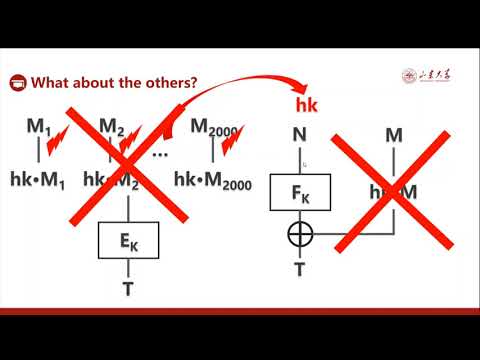CryptoDB
Efficient Side-Channel Secure Message Authentication with Better Bounds
| Authors: |
|
|---|---|
| Download: | |
| Abstract: | We investigate constructing message authentication schemes from symmetric cryptographic primitives, with the goal of achieving security when most intermediate values during tag computation and verification are leaked (i.e., mode-level leakage-resilience). Existing efficient proposals typically follow the plain Hash-then-MAC paradigm T = TGenK(H(M)). When the domain of the MAC function TGenK is {0, 1}128, e.g., when instantiated with the AES, forgery is possible within time 264 and data complexity 1. To dismiss such cheap attacks, we propose two modes: LRW1-based Hash-then-MAC (LRWHM) that is built upon the LRW1 tweakable blockcipher of Liskov, Rivest, and Wagner, and Rekeying Hash-then-MAC (RHM) that employs internal rekeying. Built upon secure AES implementations, LRWHM is provably secure up to (beyond-birthday) 278.3 time complexity, while RHM is provably secure up to 2121 time. Thus in practice, their main security threat is expected to be side-channel key recovery attacks against the AES implementations. Finally, we benchmark the performance of instances of our modes based on the AES and SHA3 and confirm their efficiency. |
Video from TOSC 2020
BibTeX
@article{tosc-2020-30086,
title={Efficient Side-Channel Secure Message Authentication with Better Bounds},
journal={IACR Transactions on Symmetric Cryptology},
publisher={Ruhr-Universität Bochum},
volume={2019, Issue 4},
pages={23-53},
url={https://tosc.iacr.org/index.php/ToSC/article/view/8452},
doi={10.13154/tosc.v2019.i4.23-53},
author={Chun Guo and François-Xavier Standaert and Weijia Wang and Yu Yu},
year=2020
}

